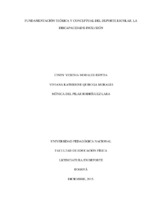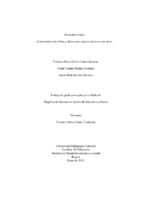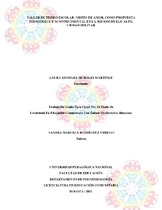Aspectos cognitivos del constructivismo del aprendizaje moral : psicología moral y ética discursiva.

Citación
Fecha
2004-01-01Autor
Quintero Mejía, Marieta
Enlace al recurso
https://revistas.pedagogica.edu.co/index.php/PYS/article/view/6670Palabras claves
Aprendizaje constructivo de la moral
Ética discursiva
Lógica del desarrollo moral
Aprendizaje moral
Keyword
Constructivist learning of moralDiscursive ethic
Logic of the moral development
Logic of the moral
Metadatos
Mostrar el registro completo del ítemResumen
En el presente artículo se dan a conocer algunos supuestos a partir de los cuales la ética discursiva-Habermas- y la lógica del desarrollo moral-Kohlberg- asumen el carácter cognitivo del enfoque constructivista del aprendizaje moral. En este aprendizaje constructivo de la moral se reconoce la idea de una lógica del desarrollo moral en la cual los individuos avanzan de una etapa inferior a la otra superior. De esta manera aquellos individuos que han alcanzado un nivel más avanzado están en la capacidad de explicar por qué los juicios en esta etapa son más apropiados que en las etapas inferiores. Estos supuestos han contribuido en el desarrollo de programas de educación moral.
Abstract
This article is intended to show some of assumption from which the discursive ethic -Habermas- and the logic of the moral development -Kohlberg- adopt the cognitive character of the constructivist perspective of logic of the moral development. In this constructivist learning of moral idea of logic moral development in which the individuals go from a lower stage to a higher one is acknowledge. In this way those individuals who have riched a higher level of moral development are more capable of explaining the reason why the judgements in this stage are more appropriate than those which are in a lower stage. These hypothesis have contributed to the organization of moral education programmes.
Editorial
Editorial Universidad Pedagógica Nacional
Fuente
Colecciones
- Pedagogía y Saberes [660]
Excepto si se señala otra cosa, la licencia del ítem se describe como https://creativecommons.org/licenses/by-nc/4.0
Ítems relacionados
Mostrando ítems relacionados por Título, autor o materia.
-
Fundamentación teórica y conceptual del deporte escolar, la discapacidad e inclusión.
Morales Espitia, Cindy Yesenia; Quiroga Morales, Viviana Katherine; Rodríguez Lara, Mónica del Pilar (Universidad Pedagógica Nacional, 2015)En el trabajo de grado que se propone realizar es la fundamentación teórica y conceptual a través de la indagación de los términos deporte escolar, discapacidad e inclusión para la elaboración de unos lineamientos pedagógicos ... -
Socioafectividad… Conociendo a los niños y niñas como sujetos afectivos con otros…
De La Hortúa Quintero, Yohanna Paola; Medina Ordoñez, Nelda Yamily; Morales Morales, Ingrid Ruth (Universidad Pedagógica Nacional, 2018)Tesis de grado para optar al título de Magíster en Desarrollo Educativo y Social, la cual se desarrolló dentro de la línea de investigación de niñez, desde allí el interés por indagar cómo se configuran las relaciones ... -
Taller de tejido escolar : Nidito de Amor, como propuesta pedagógica y acontecimental en la IED Mochuelo Alto, Ciudad Bolívar.
Morales Martínez, Laura Xiomara (Universidad Pedagógica Nacional, 2021)El presente trabajo de grado es el resultado del proceso de la Práctica Escuela Sin Fronteras y de la Práctica Pedagógica Investigativa de la Línea de Investigación Escuela Comunidad y Territorio, práctica realizada en la ...



